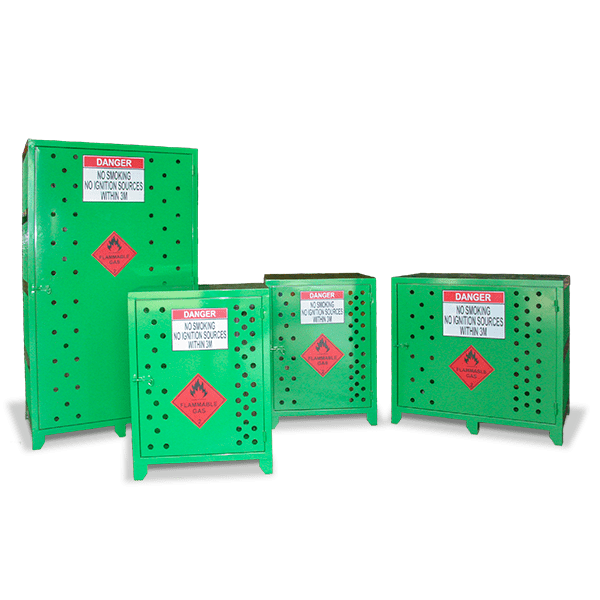How to Store Oxygen and Acetylene Cylinders Safely

Proper storage of oxygen and acetylene cylinders is of paramount importance to ensure safety in various industries, such as welding, metal fabrication, and healthcare. These cylinders contain highly flammable and potentially hazardous gases, demanding strict adherence to safety protocols.
In this guide, we’ll talk about the importance of safe storage of oxygen and acetylene cylinders in Australia and provide practical recommendations for handling these cylinders to prevent accidents, minimise risks, and promote a secure working environment.
Understanding Oxygen and Acetylene Cylinders
Oxygen and acetylene are two gases frequently stored in cylinders for a wide range of industrial applications. Whether you are directly involved in the storage and handling of these gases or work in an industry that utilises them, it is imperative to have a fundamental understanding of their properties, uses, and the hazards that can arise from improper storage. This knowledge will empower you to take the necessary precautions and implement proper storage practices to mitigate these hazards effectively.
Oxygen and Its Common Uses
Oxygen (O2) is a colourless, odourless, and tasteless gas. Oxygen is widely used in industries such as metal fabrication, automotive manufacturing, aerospace, and healthcare. It is used for cutting, welding, and brazing metals, as well as for supporting combustion in various industrial processes. In the medical field, oxygen cylinders are crucial for providing respiratory support and treating patients with breathing difficulties.
Acetylene and Its Common Uses
Acetylene (C2H2) is a highly flammable gas that is colourless and has a distinct odour. It is produced by combining calcium carbide with water. Acetylene, when mixed with oxygen in the right proportions, produces a high-temperature flame, making it a staple in industries such as construction, shipbuilding, and automotive manufacturing.
Hazards of Improper Storage
Improper storage of oxygen and acetylene cylinders can pose significant risks. Oxygen, known for its high reactivity, can accelerate the combustion of flammable materials and intensify fires if mishandled. On the other hand, acetylene is highly flammable and can result in explosions if stored and handled incorrectly.
Cylinders that are damaged, exposed to extreme heat, or stored in confined spaces can become potential hazards. Oxygen cylinders, if contaminated with oil, grease, or other combustible materials, have the potential to ignite spontaneously. Similarly, subjecting acetylene cylinders to excessive pressure or heat can cause them to decompose violently, leading to explosions.
6 Tips to Safely Store Oxygen and Acetylene Cylinders
In Australia, the storage and handling of gases in cylinders, including oxygen and acetylene, are regulated by AS 4332-2004. This standard provides essential requirements and recommendations for the safe storage of cylinders classified as Class 2 dangerous goods. By carefully following these guidelines and incorporating the following tips, you can effectively store oxygen and acetylene cylinders, mitigating potential risks and fostering a safe working environment.
1. Always store the cylinders in an upright position with valve caps on
Storing cylinders upright helps prevent accidents and ensures the valves are protected. Valve caps should be securely placed on the cylinders when not in use to prevent the ingress of dirt, moisture, or other contaminants.
2. Store small cylinders properly as they don’t have protection caps on them
Unlike larger cylinders, small oxygen and acetylene cylinders often lack protection caps. It is essential to store them securely in an upright position and ensure they are not exposed to potential damage or hazards.
3. Acetylene cylinders are not designed for environmental use where the temperatures may exceed 52ºC
Acetylene cylinders have specific limitations and should not be exposed to temperatures above 52ºC. Store them in areas where the temperature remains within the manufacturer’s recommended range to prevent potential hazards.
4. Avoid storing acetylene cylinders in any subsurface storage areas
Acetylene gas is lighter than air and can accumulate in enclosed spaces, increasing the risk of explosions. Avoid storing acetylene cylinders in the subsurface or poorly ventilated areas to prevent the buildup of gas concentration.
5. Avoid storing the cylinder in below-freezing temperature zones
Extreme cold temperatures can affect the integrity of cylinder materials and compromise their safety. Avoid storing oxygen and acetylene cylinders in areas prone to freezing temperatures to prevent any potential damage or hazards.
6. Properly secure the cylinders during transport
During transportation, it is crucial to secure the cylinders to prevent them from tipping over or becoming damaged. Use suitable restraints and ensure the cylinders are well-secured in the vehicle to avoid accidents and potential leaks.
To learn more about Australian gas cylinder storage standards, click here.
Preserve Precious Assets and Lives with Ecospill
Remember, safety is a collective responsibility. The safe storage, handling, and transportation of oxygen and acetylene cylinders, regular training, awareness, and adherence to safety guidelines are of utmost importance to ensure the well-being of personnel, protect valuable assets, and maintain a safe and secure working environment for all.
Gas cylinder storage cabinets by Ecospill offer a dedicated solution for storing oxygen and acetylene cylinders, providing additional protection against potential hazards. These cabinets are designed to meet specific safety standards and regulations, offering features such as proper ventilation, sturdy construction, and secure locking mechanisms. By employing the use of gas cylinder storage cabinets at workplaces, you can further minimise the risks associated with cylinder storage, such as the potential for damage, unauthorised access, or the accumulation of flammable gases.
Make safety a priority in your workplace. Contact Ecospill today to explore our range of gas cylinder storage cabinets.
